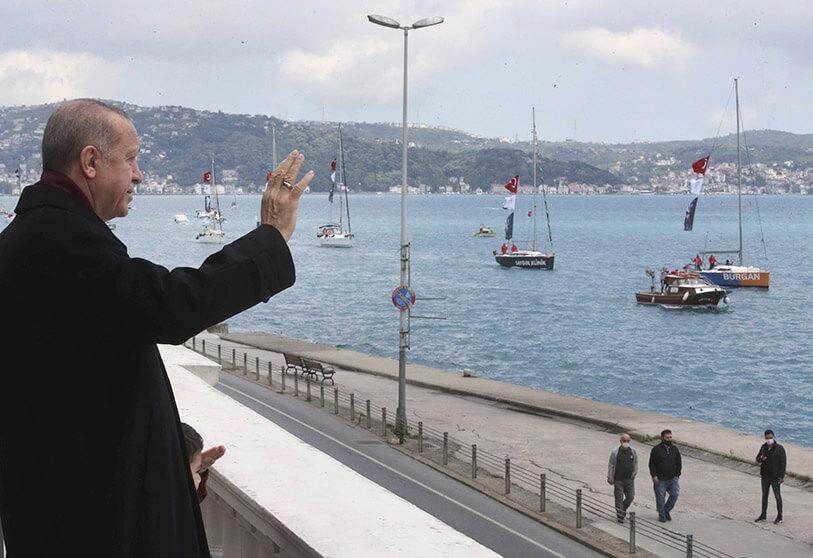By Dr Andrestinos N. Papadopoulos, Ambassador a.h.
On March 24, 2021, the Speaker of the Turkish National Assembly, Mustafa Sentop, commenting on a TV show about Turkey’s decision to withdraw from the Istanbul Convention regarding violence against women and answering questions as to whether the nation’s president can withdraw from international conventions, mentioned in general terms, that he can.
It sparked a debate in Turkey on the Montreux Convention.
As expected, this debate had international repercussions.
On April 9, President of the Russian Federation, Vladimir Putin, in a telephone conversation with President Tayyip Erdogan, noted, in the context of Turkey’s plans to build the ‘Istanbul Canal’, “the importance of preserving the 1936 Montreux Convention regarding the regime of the straits, to ensuring regional stability and security”.
On the same day, Foreign Ministry Spokesperson Maria Zakharova stressed: “We do not see any alternatives to the international law regime established under the Montreux Convention.
“We expect all respective states to assume a responsible approach toward observing it. Turkey has a special role in this respect.”
From the above, we understand what is at stake for international maritime navigation if the Montreux Convention is in any way revised or abolished.
Cyprus attaches great importance to what is happening in the straits because of our merchant shipping.
The Convention of Montreux was signed on July 20, 1936, extended to Cyprus on November 9, 1936, the date of its ratification by the United Kingdom.
The Ministry of Foreign Affairs, examining the list of conventions that the British delegation submitted to the Mixed Commission of London, took the initiative to raise its application to Cyprus to the Republic’s Attorney General.
The Attorney General declared the Montreux Convention continued to bind the Republic of Cyprus.
After that, the Ministry of Foreign Affairs, through a note dated March 18, 1969, informed the French Government that the Republic of Cyprus considers itself bound by the “1936 Montreux Convention Regarding the Regime of the Straits” under Article 8 of the Treaty of Establishment of the Republic of Cyprus and the succession norms of international law.
What is of interest, as a reaction of a contracting party, is the Turkish Foreign Ministry sent to the Government of Cyprus, through note No. 1085/51 dated July 26, 1969, of the Turkish Embassy in Nicosia, the 32nd annual report concerning the movement of vessels through the straits under Article 24 of the Convention of Montreux, whose paragraph 5 provides:
“The Government of Turkey will submit to the Secretary-General of the League of Nations as well as to the High Contracting Parties an annual report indicating the movements of foreign warships in the straits and supplying all useful information for the commerce and the by the sea and air navigation envisaged by the present Convention.”
This automatic succession of Cyprus to the Convention of Montreux presents a capital interest.
Consent
The question that arises is to know whether the restricted number of states that participated in the negotiation of a determined treaty can conclude the participation of a successor state in the treaty should be subjected to the other parties’ consent.
In other words, what matters is whether the successor of one of the parties has the right to consider itself as a party to the treaty on its own account.
In this respect, the United Nations document UN. Doc.A/CN.4/224 (pp 57 and 58) gives as examples the Convention concerning the Aland Islands, the Convention on the Suez Canal, and the Convention of Montreux.
This point is not clearly answered, when claimed that certain states had the right in their quality as successor states, to be considered as parties to the Suez Canal convention, and consequently invited to the London Conference gathering the users of the Canal, the case of Cyprus acquires particular importance, as it is marking a practice hitherto inexistent in this field.
If the consent of the High Contracting Parties was given tacitly to the succession of Cyprus to the Convention of Montreux, the character of the Convention and the fact it is open to other countries permits the conclusion that Cyprus has the right to become a party to the Convention of Montreux through a notification of succession.
The proof is there.
The French Government accepted the notification of Cyprus’ succession, and the Turkish Foreign Ministry sent to the Government of Cyprus the 32nd annual report concerning the movement of vessels through the straits.










